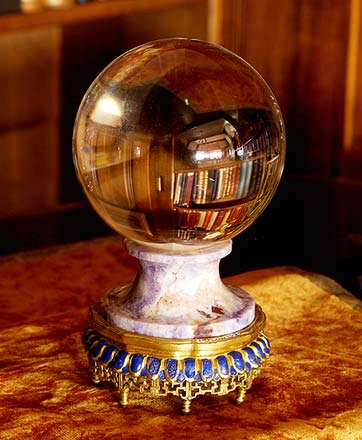Religious affiliation wiped out by Canadian Wikipedia enthusiasts

Canadian Prime Minister MacKenzie King's crystal ball. King was a spiritualist, participating in seances and table rapping with his close friends.
Until a few days ago, former Prime Minister Paul Martin was still Catholic, Stephen Harper was affiliated with the Christian Missionary Alliance and the late MacKenzie King used to be a slightly unconventional Presbyterian. Then, this information mysteriously vanished from Wikipedia. A quick online search revealed that the sudden disappearance of information concerning the religious affiliations of Canadian politicians-both dead and alive-was a haphazard editorial decision taken after a brief online discussion between the likes of DoubleBlue, Ducio1234 and Skeezix1000, thus confirming the worst misgivings that so many have about Wikipedia.
In a single swoop, denominational information concerning former prime ministers John Diefenbaker, Lester B. Pearson, Louis St. Laurent, R.B. Bennett, and all others starting from September 25, 1926–when Prime Minister Arthur Meighen left office for the second time–was removed. Perhaps this was a watershed moment in Canadian religious history that I had not known about, maybe DoubleBlue and friends discovered something entirely new about our country’s past, or perhaps they simply have not gotten around to deleting Meighen’s Presbyterianism yet.
The casual elimination of information that interests scores of internet users by anonymous individuals confirms the worst about Wikipedia and explains why most university professors strongly discourage their students from relying on a source which can be altered at whim by anyone with a modem. A small handful of anonymous internet users have made an editorial decision, leading to the deletion of key information about Canada’s past on one of the world’s most frequented websites. To make matters worse, they have done so based on spurious logic that the religious views of politicians have never been at the centre of Canadian political discourse. Only recently, Paul Martin’s Catholic faith and that of Joe Clark have come up within the context of the gay rights and the same-sex marriage debate. But apparently information on church affiliation has no place in Wikipedia „infoboxes.” Yet if the religious views of our political leaders are insignificant, then how much more important is it for the average reader to know that Mr. Harper decided to name his children Ben and Rachel, or that RB Bennett never got married?
Deleting public information should not be taken lightly and some of us would support preserving it, even when that information gives rise to questions, debates and beckons clarification. The argument that this information should be deleted from biography summaries and buried within Wikipedia articles only if appropriate suggests that the people who took this editorial decision do not understand the fundamental usefulness of this online encyclopedia. Wikipedia can be helpful when we are looking to find bits and pieces of information quickly and without much effort. But very few people care to be inconvenienced by having to fish through lengthy text to find what they are looking. If we want to spend time doing serious research, then there are is a myriad of sources far more reputable than Wikipedia.
There is little doubt that the personal religious views of politicians are less ubiquitous in Canada than in the United States. Yet nearly every political leader will at some point be asked to divulge his or her personal beliefs. Former Liberal Stéphane Dion–who until recently was widely seen as being secular–revealed on a television program that the environment he cared for so deeply was „given to us by God” and reportedly told host Michael Coren after the show that he was a Catholic. Bloc Québécois leader Gilles Duceppe, on the other hand, appears to be an atheist. Mr. Duceppe’s Wikipedia biography still mentions this, indicating that enthusiastic users have not yet gotten around to pressing the delete button. Who could argue with a straight face that religion was not an issue in Stockwell Day’s failed leadership of the now defunct Canadian Alliance? Day’s prior career as an Evangelical pastor and his belief in Creationism made it impossible for him to launch a mainstream conservative movement. Former Prime Minister Joe Clark’s pro-choice views and his support of gay rights occasionally put him at odds with the Catholic Church, yet he confirmed his Catholic faith in public and countered during a Canada AM show eight years ago that „anyone who knows anything about the Roman Catholic Church knows that [abortion] has been an issue of division for quite sometime.”
An online discussion on the importance of the denominational affiliations of our politicians, or even a Wikipedia article on this matter, could serve as a positive experience for all, as it would enrich our body of public knowledge. But relegating information deemed unimportant by a select few to the rubbish heaps of cyberspace serves absolutely no one.
Christopher Adam
-Your comments are welcome in English, French or in Hungarian. Please use the form below to post your thoughts, and include your name in the „Név” field and your e-mail address, which will not be published. Click on „hozzászólás küldése” to send.



1:47 du.
There’s nothing new in this. Wikipedians have been deleting religious affiliation for years. Indeed, whole articles such as Nobel Prizewinners by religion regularly disappear.
2:21 de.
It depends on whether it’s a „good guy” or a „bad guy”. People keep removing „Jewish” from say Ben Bernanke but not Bernard Madoff.
4:38 du.
I think that people who are not of some old faith religions (such as Christianity, Catholicism, Jewish, Islam, et al), believe that such faiths are antiquated and wrong and anyone who follows such is a brainwashed fool, deluded, confused, scared or something. Those are obviously qualities that don’t inspire confidence, but seem to be prevalently visible regardless of the facts.
4:45 du.
Jonathan may be right. Certainly many editors on Wikipedia are anti-religious so do not want it known that eminent, respectable people – even eminent scientists – have or had a religion. I think that they are particularly inimical to Catholicism and Judaism.